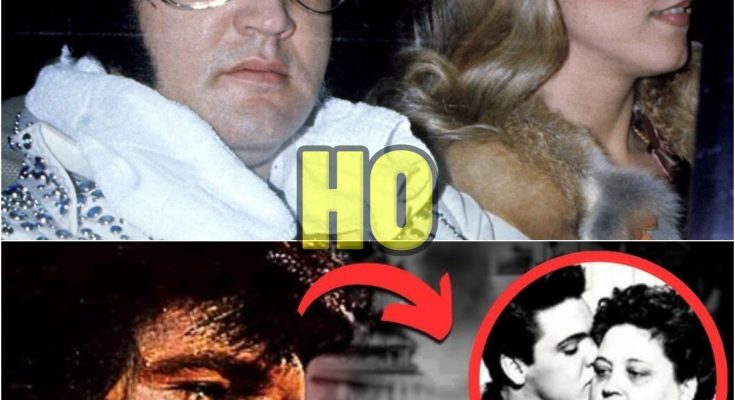Uncover the untold story of one of Elvis Presley’s most emotional moments. The King of Rock ‘n’ Roll, celebrated for his charisma, talent, and larger-than-life persona, faced an unexpected insult that left him in tears. What could have triggered such a raw and heartfelt reaction from one of music’s most iconic figures?

Elvis Presley, the King of Rock and Roll, has been an iconic figure for decades. With his magnetic charm, transcendent voice, and electrifying performances, he captured the hearts of millions around the world. But beneath his larger-than-life persona, Elvis was just a man, a human being with his own vulnerabilities, insecurities, and emotional battles.
While the world saw him as a symbol of confidence, fame, and power, Elvis faced the constant weight of public scrutiny. Even the King of Rock and Roll was susceptible to heartache, and one particular moment in the mid-1970s would reveal just how deeply a single insult could affect him.
The story takes us to a quiet evening in Memphis, Tennessee, where Elvis sought refuge from the pressures of fame. He retreated to his beloved sanctuary, the Memphian Theater, a place where he could temporarily escape the public eye. It was a rare moment for him to unwind and enjoy some peace in the company of his closest friends and his girlfriend at the time, Linda Thompson.
The theater, with its dim lighting and private atmosphere, was one of the few places Elvis could truly let down his guard and experience normalcy. For that night, he wasn’t the King. He was simply Elvis, a man who loved movies, laughter, and the company of his inner circle—the Memphis Mafia.
The evening began like any other, filled with warmth, laughter, and camaraderie. Elvis shared jokes, leaned in to whisper with Linda, and reveled in the comfort of being surrounded by those who loved him for who he truly was, not for his fame. But what should have been a peaceful night took a dark turn when a seemingly trivial encounter shattered the serenity of the moment.
During a break in the film, Elvis wandered over to the concession stand for a snack, a small act that many would overlook, but for Elvis, it was a rare opportunity to experience something ordinary. As he approached the counter, an older woman approached him with an accusation. She claimed that her daughter, a concession worker at the theater, had not been paid for her work that evening.
Surprised, Elvis explained that he had paid in advance for the theater rental, and that the misunderstanding was likely due to an error. However, the woman was unrelenting, her voice becoming louder and more accusatory with each passing moment.
Despite Elvis’s calm attempts to de-escalate the situation, the woman grew increasingly hostile. Her words cut deep, accusing Elvis of being neglectful, of not appreciating the people who served him. For someone who had been so generous to others throughout his life, these accusations stung. But it was the woman’s final words that left an indelible mark on Elvis’s spirit.
“You’re fat,” she said sharply, her words echoing in the theater like a dagger to his heart.
It wasn’t just a comment about his appearance. To Elvis, it was a direct attack on one of his most deeply held insecurities. Over the years, he had been acutely aware of the public’s scrutiny of his body, especially his weight. The tabloids had dissected every fluctuation, and the media had cruelly highlighted any physical changes. In that moment, it felt as though the woman had stripped away all of Elvis’s armor, exposing his deepest vulnerability in front of the people who mattered most to him.
The room fell into an uncomfortable silence as Elvis stood there, visibly shaken. His eyes, once bright and filled with life, dimmed. His posture, which usually exuded confidence and command, sagged under the weight of the insult. Without a word, he turned and walked away from the confrontation, his shoulders heavy, his head lowered. His friends, who had witnessed the entire exchange, could only watch in stunned silence. The King of Rock and Roll, who had captivated millions with his larger-than-life presence, suddenly seemed small and fragile.
The atmosphere in the theater shifted dramatically. The laughter and lightheartedness that had filled the air were replaced by an uneasy tension. Elvis returned to his seat, his mind racing, his thoughts consumed by the woman’s words. Linda Thompson, sitting by his side, reached for his hand, offering him silent comfort, but the hurt was evident in his eyes.
The Memphis Mafia, who had always stood by Elvis, looked on helplessly. They had seen him face the pressures of fame with resilience, but this moment was different. It was personal. It was a reminder that even the King, with all his talent and fame, was still human.
As the night wore on, the group left the theater in silence. The usual banter and jokes were replaced by an uncomfortable quiet. Elvis sat staring out the window, his mind replaying the encounter over and over again. His friends could do little to ease his pain. Finally, in a voice barely above a whisper, Elvis spoke the words that revealed the depth of his hurt.
“What did I do?” he asked, his voice heavy with disbelief and sorrow. “Why would she say that?”
It was a question that no one could answer. Despite all the adoration, the accolades, and the fame, Elvis was left grappling with the sting of cruelty. He had always given so much of himself to others—whether through charity, personal kindness, or his music—and yet, in a single moment, a stranger’s words had cut through all of that. It wasn’t just the insult that hurt—it was the betrayal of someone speaking to him in such a harsh and unprovoked way.
In the quiet of Graceland later that evening, Elvis retreated to his room. His friends gave him the space he needed, but their concern for him was palpable. They could see how deeply the encounter had affected him, and they knew he needed time to process his emotions. In his solitude, Elvis replayed the words over and over in his mind, trying to make sense of the cruelty he had endured.
Yet, even in the depths of his pain, Elvis’s natural kindness and generosity shone through. The following evening, after much contemplation, he brought up the woman’s daughter—the concession worker. Despite everything that had happened, Elvis suggested sending the girl a gift, something extravagant, like a car.
His friends were stunned. After being so deeply hurt, they couldn’t understand why he would want to reward the daughter for something her mother had done. But Elvis insisted that the girl was innocent in the matter, and he couldn’t bear the thought of her being negatively affected by her mother’s actions.
Though his friends gently persuaded him to let the idea go, this moment revealed something profound about Elvis’s character. Even when hurt, his first instinct was to show kindness. He may have been deeply vulnerable, but his heart remained as large as his talent. His ability to rise above the cruelty, to reflect on others’ needs, and to find strength in the love of his inner circle is what made him not only an icon but also a man worthy of admiration.
The night at the Memphian Theater was not just a fleeting moment of pain—it was a revealing glimpse into the human side of Elvis Presley. Behind the flashing lights, the adoring crowds, and the endless accolades, there was a man who experienced the same emotions as everyone else. The insult was a reminder that fame could never shield him from the same challenges we all face: judgment, cruelty, and the weight of insecurity.
But it was also a reminder that even in his most vulnerable moments, Elvis Presley remained a man of compassion, kindness, and resilience. This story shows us that the King of Rock and Roll was more than just a performer—he was a human being, shaped by the same vulnerabilities, hopes, and fears as the rest of us. And it is this humanity, this ability to show kindness even in the face of cruelty, that continues to make his legacy endure, not just through his music, but through the heart he shared with the world.



